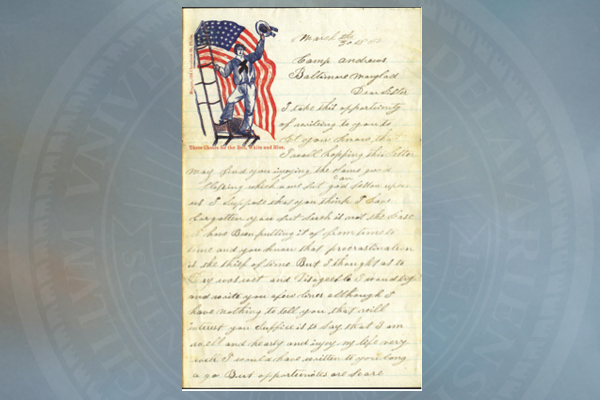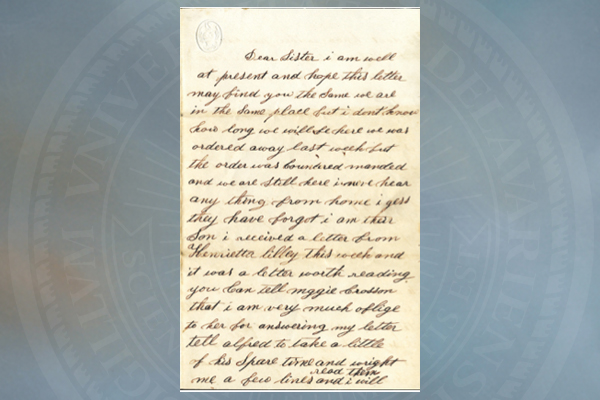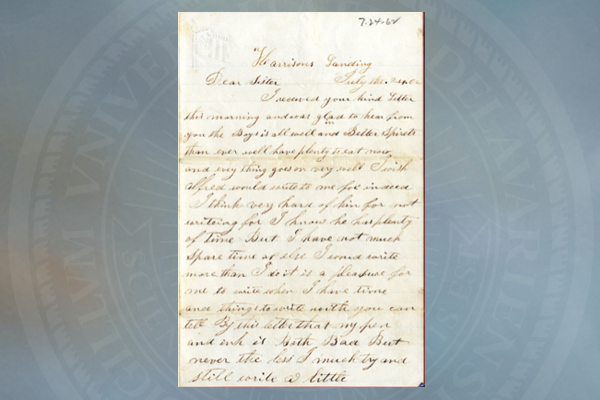


Civil War letters
Library digital collection features Civil War letters of David N. Lilley
8:41 a.m., Feb. 11, 2015--The University of Delaware Library has announced a new digital collection, the “Civil War Letters of David N. Lilley,” which is available at this website.
This small collection of 37 letters written between 1861 and 1864 documents the everyday experiences of a soldier during the American Civil War and reflects the hardships experienced by thousands of military personnel during the conflict.
Campus Stories
From graduates, faculty
Doctoral hooding
David N. Lilley (1842-87), a resident of Newark, Delaware, for most of his life, served in the Union Army during the Civil War. In 1861, at the age of 19, Lilley enlisted in Company C, 2nd Regiment, Delaware Volunteers. After training, he was assigned to the Blue and Elk Rangers, a local unit that was involved in many significant military engagements in Maryland and Virginia.
Throughout his service Lilley wrote letters to his older sister Annie Lilley, who lived in Newark. These letters chronicle his wartime experiences and document the soldier’s state of mind: Lilley was alternately content and optimistic or depressed and uncertain of his continued survival.
Lilley’s letters originated from places such as Camp Brandywine near Wilmington, Delaware, Camp Andrews in Baltimore, and Falmouth, Virginia.
Beginning in 1861, he described the harsh training conditions in camp and recounted events such as escape attempts by trainees (and their subsequent punishment). At one point, a soldier was shot in the arm for cursing at his commanding officer.
Lilley frequently discussed the boredom of guard duty, his excitement at the very rare occasion of getting fresh food and slowly becoming used to camp life.
Lilley wrote about the social and environmental conditions of the locales he visited and gave blunt assessments, such as when he described the Eastern Shore of Virginia as the “most God forsaken part of the country” he ever saw.
Regarding the battle of Fair Oaks, Lilley said, “Men fell dead like wheat before the cradle.” After the battle of Chancellorsville, he gave the number (and some of the names) of men who died, were captured and were wounded. He illustrated the sudden, shocking violence of war by sharing an anecdote in which he was “walking with a man when he had his head knocked clean off.”
In his letters, Lilley frequently asked his sister Annie to relay information to other family members, especially his brother Alfred Lilley. Following a particularly deadly battle, Lilley advised Alfred: “Never to enlist while the world stands.”
On May 11, 1863, Lilley wrote to his mother about a camp visit from President Abraham Lincoln. Lilley discussed the relationship between “rebel” and Union soldiers and occasionally expressed admiration for the bravery of the enemy. In one instance, he recounted a humorous exchange between men on opposite sides of a river (and opposite sides of the conflict), in which they debated the merits of the Ironclad Merrimack versus the Monitor and cotton versus wool.
Because of variations in handwriting, grammar and style, it appears that Lilley may have had other soldiers write a few of the letters on his behalf. A number of the letters are written on patriotic stationery.
Lilley was born in 1842 in Cecil County, Maryland. He was one of 12 children in a family that moved near Newark when he was quite young.
Lilley attended school in Newark briefly but gave up his studies in order to help support the rest of the family. Initially, he worked for his father as a well digger and quarry man; later he was employed at the Dean Woolen Mills.
After being discharged in 1864, Lilley returned to Newark where his mother, sister and other members of his immediate family still lived. On Feb. 15, 1887, he was the victim of a railroad accident, which later required that his foot be surgically amputated. He died on Feb. 24, 1887, from the resulting complications of lockjaw and blood poisoning.
The original David Lilley letters are available for research in Special Collections at the University of Delaware Library on the second floor of the Morris Library. The online finding aid to the collection links directly to the digitized letters, which are hosted in UDSpace, the digital institutional repository of the University of Delaware.
Digitization of the “Civil War Letters of David N. Lilley” was a collaboration between library staff in the Manuscripts and Archives Department, the Center for Digital Collections and the Library Server and Data Management Department.










